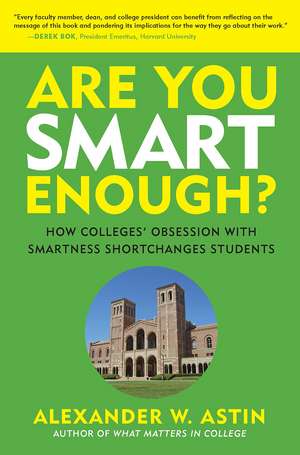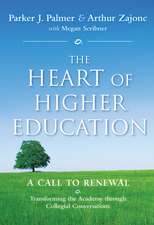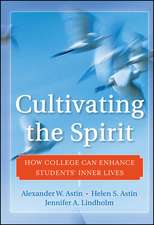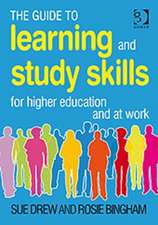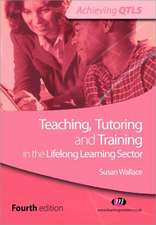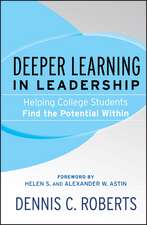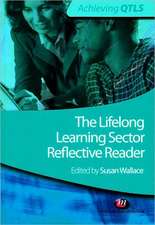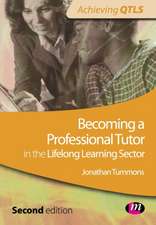Are You Smart Enough?: How Colleges' Obsession with Smartness Shortchanges Students
Autor Alexander W. Astinen Limba Engleză Paperback – 29 mar 2016
| Toate formatele și edițiile | Preț | Express |
|---|---|---|
| Paperback (1) | 231.56 lei 3-5 săpt. | |
| Taylor & Francis – 29 mar 2016 | 231.56 lei 3-5 săpt. | |
| Hardback (1) | 986.27 lei 3-5 săpt. | |
| Taylor & Francis – 6 apr 2016 | 986.27 lei 3-5 săpt. |
Preț: 231.56 lei
Nou
Puncte Express: 347
Preț estimativ în valută:
44.32€ • 48.16$ • 37.26£
44.32€ • 48.16$ • 37.26£
Carte disponibilă
Livrare economică 31 martie-14 aprilie
Preluare comenzi: 021 569.72.76
Specificații
ISBN-13: 9781620364482
ISBN-10: 1620364484
Pagini: 160
Dimensiuni: 140 x 210 x 10 mm
Greutate: 0.3 kg
Ediția:1
Editura: Taylor & Francis
Colecția Routledge
Locul publicării:Oxford, United Kingdom
ISBN-10: 1620364484
Pagini: 160
Dimensiuni: 140 x 210 x 10 mm
Greutate: 0.3 kg
Ediția:1
Editura: Taylor & Francis
Colecția Routledge
Locul publicării:Oxford, United Kingdom
Public țintă
PostgraduateCuprins
Introduction 1. The Higher Education Pecking Order 2. Admissions Madness 3. Developing Smartness. Higher Education’s True Mission 4. The Challenge to Educational Equity 5. Which Kinds of Smartness Really Matter? 6. Faculty Culture. The Core of the Problem 7. Is There Any Way Out? Epilogue References
Notă biografică
Alexander W. Astin is Allan M. Cartter Distinguished Professor Emeritus of Higher Education, Founding Director of the Higher Education Research Institute at UCLA, and Founding Director of the Cooperative Institutional Research Program, the nation’s largest and oldest study of college students and faculty. Previously Dr. Astin was Director of Research for both the American Council on Education and the National Merit Scholarship Corporation. The author of 22 books and some 300 other publications in the field of higher education, Dr, Astin has been a recipient of awards for outstanding research from 13 national associations. In 2010 the Journal of Higher Education identified Dr. Astin as the author most frequently cited by others in the field of higher education. He lives in Los Angeles, California.
Recenzii
“Professor Astin discusses a fundamental defect in the way professors and college officials regard their students, their own approach to teaching, and the quality of their institution. Every faculty member, dean, and college president can benefit from reflecting on the message of this book and pondering its implications for the way they go about their work.”
Derek Bok, former President of Harvard University
"For five decades, Alexander Astin has been one of the most powerful voices in higher education. In this volume, he challenges colleges and universities to shift their focus from selecting excellent students to developing excellence in all students. This is a book about the fundamental purposes of college that should be read by those who work in, attend, or care about higher education."
Arthur Levine, President, Woodrow Wilson National Fellowship Foundation, and President Emeritus, Teachers College, Columbia University
"This provocative work from a towering figure in higher education twists the kaleidoscope to reveal an unconscious bias that ought to worry us. Astin argues that a preoccupation with conventional "smartness" pervades faculty culture, widens inequities, and perpetuates assessment methods that foster unhealthy competition while they fail to measure what matters: whether students are learning and colleges are improving society. He encourages educators to open their minds to distortions implicit in the relentless race to recruit the smartest of the smart. We should all slow down long enough to absorb this wise book."
Diana Chapman Walsh, President Emerita, Wellesley College; Trustee Emerita, Amherst College; MIT Corporation executive committee
"Under Sandy Astin’s brilliant tutelage, a talented cadre of educational researchers and innovators has provided compelling evidence on the practices that work best to foster deep learning and advance underserved student success in college. But the question remains: why don’t educators seize on this evidence to drive far-ranging change in higher education’s core educational practices? Mincing no words, Astin now answers that question, and calls for a radical recasting of educators’ most fundamental assumptions about 'talent' and 'merit.'
In this direct and compelling challenge to the profession, Astin accurately points out that educators devote far more attention to the credentials, readiness, and 'merit' of students we admit to college than we do to what actually happens to students’ learning as they progress toward the finish line. Probing the self-serving assumptions that hold bad pedagogical practice in place, Astin calls on educators, not just to examine our values and beliefs, but to radically amend them."
Carol Geary Schneider, President
Association of American Colleges and Universities
"While it seems a simple point that American colleges and faculty value being and acquiring smart over developing smartness, this observation proves a riveting and profound starting place for insights about rankings, test scores, admissions, grades, academic standards, remedial education, faculty culture, and reform. Astin imagines what a university focused on enhancing learning, adding value and affective learning might be like. This is a powerful and important book."
José Antonio Bowen, President of Goucher College and author of Teaching Naked
“This book is must reading for higher education faculty members and administrators. I resonate powerfully with Dr. Astin’s central tenet – that ‘Strengthening the education of students at all levels is vital to the welfare of our society.’ Without character development, simply increasing graduates’ smarts will not create the multi-cultural, globally interdependent democracy we value and need.”
Arthur W. Chickering, Author of Cool Passion: Challenging Higher Education
"Sandy Astin's body of research and scholarship constitute one of the great intellectual treasures in the study of higher education. His new book reminds us that the development of intellectual talent across the full range of student ability, and not just a fixation with the brightest, is what we should be about. It is an important clarion call for American postsecondary education."
Ernest Pascarella, Professor and Mary Louise Petersen Chair of Higher Education, University of Iowa
Derek Bok, former President of Harvard University
"For five decades, Alexander Astin has been one of the most powerful voices in higher education. In this volume, he challenges colleges and universities to shift their focus from selecting excellent students to developing excellence in all students. This is a book about the fundamental purposes of college that should be read by those who work in, attend, or care about higher education."
Arthur Levine, President, Woodrow Wilson National Fellowship Foundation, and President Emeritus, Teachers College, Columbia University
"This provocative work from a towering figure in higher education twists the kaleidoscope to reveal an unconscious bias that ought to worry us. Astin argues that a preoccupation with conventional "smartness" pervades faculty culture, widens inequities, and perpetuates assessment methods that foster unhealthy competition while they fail to measure what matters: whether students are learning and colleges are improving society. He encourages educators to open their minds to distortions implicit in the relentless race to recruit the smartest of the smart. We should all slow down long enough to absorb this wise book."
Diana Chapman Walsh, President Emerita, Wellesley College; Trustee Emerita, Amherst College; MIT Corporation executive committee
"Under Sandy Astin’s brilliant tutelage, a talented cadre of educational researchers and innovators has provided compelling evidence on the practices that work best to foster deep learning and advance underserved student success in college. But the question remains: why don’t educators seize on this evidence to drive far-ranging change in higher education’s core educational practices? Mincing no words, Astin now answers that question, and calls for a radical recasting of educators’ most fundamental assumptions about 'talent' and 'merit.'
In this direct and compelling challenge to the profession, Astin accurately points out that educators devote far more attention to the credentials, readiness, and 'merit' of students we admit to college than we do to what actually happens to students’ learning as they progress toward the finish line. Probing the self-serving assumptions that hold bad pedagogical practice in place, Astin calls on educators, not just to examine our values and beliefs, but to radically amend them."
Carol Geary Schneider, President
Association of American Colleges and Universities
"While it seems a simple point that American colleges and faculty value being and acquiring smart over developing smartness, this observation proves a riveting and profound starting place for insights about rankings, test scores, admissions, grades, academic standards, remedial education, faculty culture, and reform. Astin imagines what a university focused on enhancing learning, adding value and affective learning might be like. This is a powerful and important book."
José Antonio Bowen, President of Goucher College and author of Teaching Naked
“This book is must reading for higher education faculty members and administrators. I resonate powerfully with Dr. Astin’s central tenet – that ‘Strengthening the education of students at all levels is vital to the welfare of our society.’ Without character development, simply increasing graduates’ smarts will not create the multi-cultural, globally interdependent democracy we value and need.”
Arthur W. Chickering, Author of Cool Passion: Challenging Higher Education
"Sandy Astin's body of research and scholarship constitute one of the great intellectual treasures in the study of higher education. His new book reminds us that the development of intellectual talent across the full range of student ability, and not just a fixation with the brightest, is what we should be about. It is an important clarion call for American postsecondary education."
Ernest Pascarella, Professor and Mary Louise Petersen Chair of Higher Education, University of Iowa
Descriere
This book explores the many ways in which the obsession with “being smart” distorts the life of a typical college or university, and how this obsession leads to a higher education that shortchanges the majority of students, and by extension, our society’s need for an educated population.
